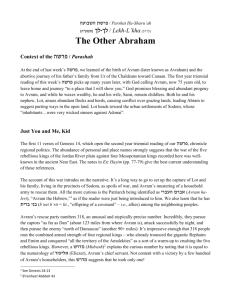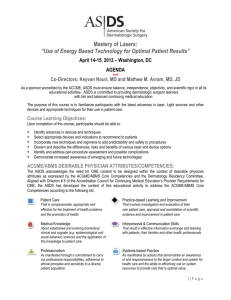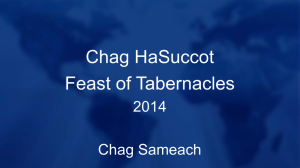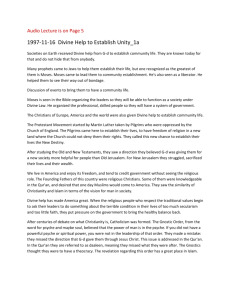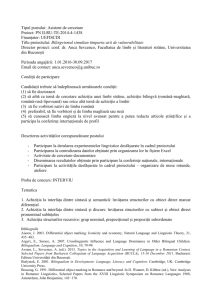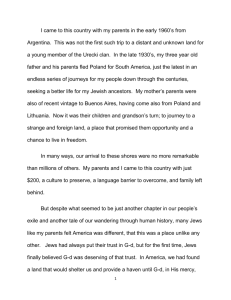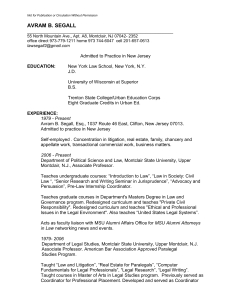Open Book: Lekh Lekha
advertisement
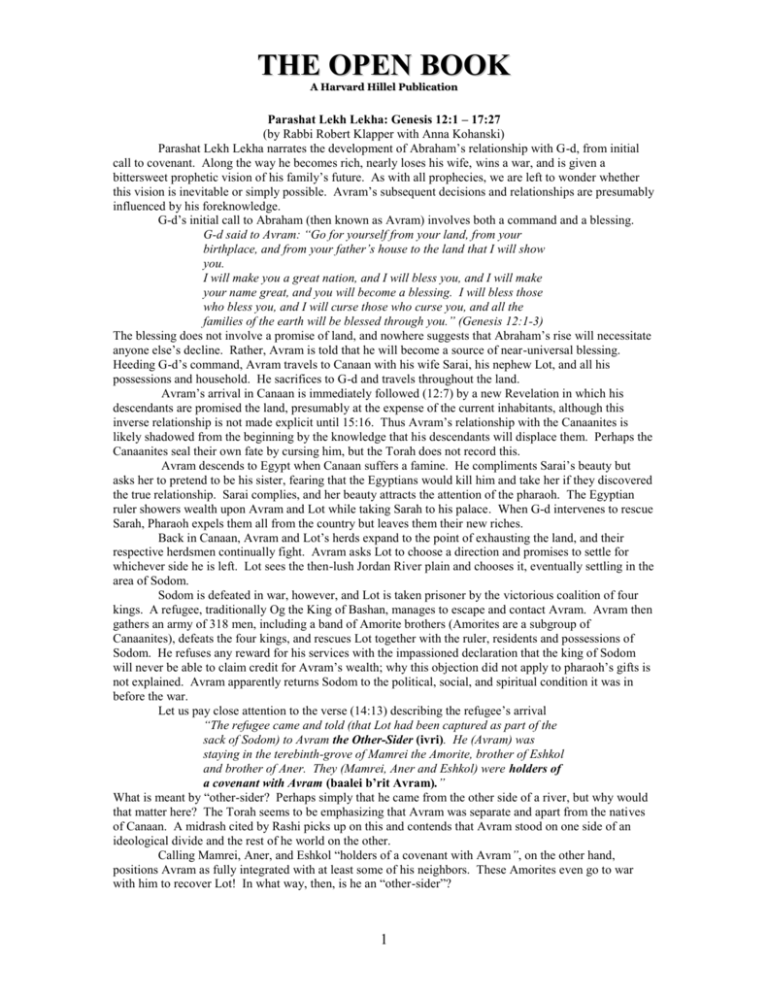
THE OPEN BOOK A Harvard Hillel Publication Parashat Lekh Lekha: Genesis 12:1 – 17:27 (by Rabbi Robert Klapper with Anna Kohanski) Parashat Lekh Lekha narrates the development of Abraham’s relationship with G-d, from initial call to covenant. Along the way he becomes rich, nearly loses his wife, wins a war, and is given a bittersweet prophetic vision of his family’s future. As with all prophecies, we are left to wonder whether this vision is inevitable or simply possible. Avram’s subsequent decisions and relationships are presumably influenced by his foreknowledge. G-d’s initial call to Abraham (then known as Avram) involves both a command and a blessing. G-d said to Avram: “Go for yourself from your land, from your birthplace, and from your father’s house to the land that I will show you. I will make you a great nation, and I will bless you, and I will make your name great, and you will become a blessing. I will bless those who bless you, and I will curse those who curse you, and all the families of the earth will be blessed through you.” (Genesis 12:1-3) The blessing does not involve a promise of land, and nowhere suggests that Abraham’s rise will necessitate anyone else’s decline. Rather, Avram is told that he will become a source of near-universal blessing. Heeding G-d’s command, Avram travels to Canaan with his wife Sarai, his nephew Lot, and all his possessions and household. He sacrifices to G-d and travels throughout the land. Avram’s arrival in Canaan is immediately followed (12:7) by a new Revelation in which his descendants are promised the land, presumably at the expense of the current inhabitants, although this inverse relationship is not made explicit until 15:16. Thus Avram’s relationship with the Canaanites is likely shadowed from the beginning by the knowledge that his descendants will displace them. Perhaps the Canaanites seal their own fate by cursing him, but the Torah does not record this. Avram descends to Egypt when Canaan suffers a famine. He compliments Sarai’s beauty but asks her to pretend to be his sister, fearing that the Egyptians would kill him and take her if they discovered the true relationship. Sarai complies, and her beauty attracts the attention of the pharaoh. The Egyptian ruler showers wealth upon Avram and Lot while taking Sarah to his palace. When G-d intervenes to rescue Sarah, Pharaoh expels them all from the country but leaves them their new riches. Back in Canaan, Avram and Lot’s herds expand to the point of exhausting the land, and their respective herdsmen continually fight. Avram asks Lot to choose a direction and promises to settle for whichever side he is left. Lot sees the then-lush Jordan River plain and chooses it, eventually settling in the area of Sodom. Sodom is defeated in war, however, and Lot is taken prisoner by the victorious coalition of four kings. A refugee, traditionally Og the King of Bashan, manages to escape and contact Avram. Avram then gathers an army of 318 men, including a band of Amorite brothers (Amorites are a subgroup of Canaanites), defeats the four kings, and rescues Lot together with the ruler, residents and possessions of Sodom. He refuses any reward for his services with the impassioned declaration that the king of Sodom will never be able to claim credit for Avram’s wealth; why this objection did not apply to pharaoh’s gifts is not explained. Avram apparently returns Sodom to the political, social, and spiritual condition it was in before the war. Let us pay close attention to the verse (14:13) describing the refugee’s arrival “The refugee came and told (that Lot had been captured as part of the sack of Sodom) to Avram the Other-Sider (ivri). He (Avram) was staying in the terebinth-grove of Mamrei the Amorite, brother of Eshkol and brother of Aner. They (Mamrei, Aner and Eshkol) were holders of a covenant with Avram (baalei b’rit Avram).” What is meant by “other-sider? Perhaps simply that he came from the other side of a river, but why would that matter here? The Torah seems to be emphasizing that Avram was separate and apart from the natives of Canaan. A midrash cited by Rashi picks up on this and contends that Avram stood on one side of an ideological divide and the rest of he world on the other. Calling Mamrei, Aner, and Eshkol “holders of a covenant with Avram”, on the other hand, positions Avram as fully integrated with at least some of his neighbors. These Amorites even go to war with him to recover Lot! In what way, then, is he an “other-sider”? 1 THE OPEN BOOK A Harvard Hillel Publication My suggestion is that Avram’s knowledge of the future inevitably separated him from his neighbors. The question is how, given that knowledge, he was nonetheless able to enter into covenant with them. Let us turn to verses 15:13-16, which I translate as follows: (G-d) said to Avram: “Know for certain that your descendants will be aliens in a land not theirs, where they will be enslaved and oppressed, for four hundred years. The fourth generation will return here, since the sin of the Amorites is not yet complete.” Avram learns that that his descendents must wait four generations to inherit Canaan because the Amorites will not fully deserve dispossession until then. Apparently in Avram’s time the Amorites were not yet defined solely by their transgressions. Aner, Eshkol and Mamrei may have been typical Amorites, with their loyalty to Avram an example of a surviving national capacity for virtue. Alternatively, their very existence may have been the nationally redeeming virtue. Aner, Eshkol and Mamrei are described as “holders of a covenant with Avram”. Possibly the covenant was a formal mutual-defense treaty, and implies no genuinely human relationship. Gersonides seems to read the term in this reductive fashion, commenting that the moral of this story is that it pays to purchase allies. Rashi, however, cites a midrash that identifies the “covenant” in question as circumcision. In the midrash, Aner, Eshkol, and Mamrei support Avram’s decision (later in the narrative of the parashah) to obey G-d’s command to circumcise himself (to have a berit). Netziv goes even further, suggesting that these Amorites in fact shared Avram’s faith. These interpretations present Avram as in genuine relationship with them, intensifying the difficulty posed by his description as “other-sider”. My tentative suggestion is that Aner and his brothers shared Avram’s knowledge of the future and accepted it, as Saul’s son Jonathan accepted that David would inherit Saul’s kingdom. Verses 14:22-4 suggest, however, that the relationship exacted a spiritual cost. Avram said to the king of Sodom: I have sworn to Hashem the Exalted G-d, Owner of heaven and earth, that I will not take even a thread or shoelace, or anything of yours. You will never be able to say “I made Avram rich”. Far be it from me! Only what the young men have eaten (will I take), and the share of the men who accompanied me; Aner, Eshkol, and Mamre—they will take their fair share.” Avram’s grand gesture of personally refusing the spoils of war is seriously undermined by the necessity of distributing them to the Amorites, and he even feels compelled to emphasize that they will get all they deserve under the normal rules of war. Perhaps whatever relationship Avram maintained with them was a mistake, one that should have been prevented by his knowledge of their conflicting destinies. But an approach I find more appealing emerges from a rabbinic treatment of the quarrel between Avram’s and Lot’s shepherds. Rashi cites a midrash that identifies the issue between the shepherds as being the permissibility of grazing their flocks on private land. Lot’s shepherds argued that the land has already been promised to Avram, and thus could be used by his presumptive heir without permission from the current occupants. Avram’s shepherds countered that the promise did not sever existing property rights. Avram’s shepherds are correct, of course, and Lot’s over-reliance on one future may ironically be the cause of his disinheritance. (Ironically, his inability to see another future leads him to choose the soon-to-be destroyed Sodom as his residence.) And yet Avram’s whole religious life is rooted in his willingness to treat the promised future as real, to make life (and death) choices that make no sense in the present. How do Avram and Lot differ? I suggest that Avram’s greatness lay in his capacity to be simultaneously conscious of present circumstances and future inevitabilities, in particular to prevent his knowledge of the future from interfering with his human obligations in the world as it was. Only someone with that capacity could be Gersonides, or Levi Ben Gershon, was a French philosopher, exegete, mathematician, and physician; born at Bagnols in 1288; died April 20, 1344. (www.jewishencyclopedia.com keyword Gersonides). Netviz: Naftali Zevi Judah Berlin, was born in Mir, 1817 and died in Warsaw in 1893. He was a renowned biblical and talmudic scholar, head of the Valuzhun Yeshivah. (Jewish Theological Seminary Archives). 2 THE OPEN BOOK A Harvard Hillel Publication trusted with advance knowledge of the Divine plan. And yes, human obligations often carry spiritual costs as well as rewards. The challenge of integrating belief in and action for Jewish destiny with real-world morality is still very much with us. I suggest that the line “for the sin of the Amorites is not yet complete” (15:16) merits much study, and that Avram’s ability to live simultaneously in the real and the promised ideal should be both instructive and inspirational. 3
